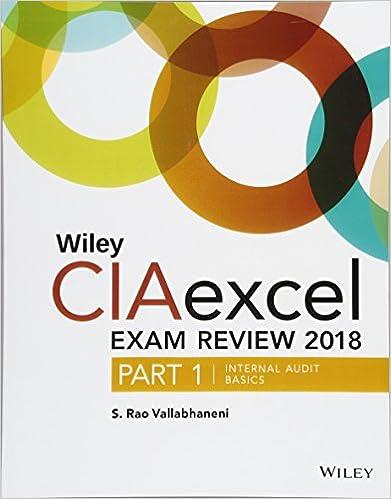Question
Ray, the owner of a small company, asked Holmes, CPA, to conduct an audit of the company's financial statements. Ray told Holmes that the audit
Ray, the owner of a small company, asked Holmes, CPA, to conduct an audit of the company's financial statements. Ray told Holmes that the audit must be completed in time to submit audited financial statements to a bank as part of a loan application. Holmes immediately accepted the engagement and agreed to provide an auditor's report within three weeks. Ray agreed to pay Holmes a fixed fee plus a bonus if the loan was granted. Holmes hired two accounting students to conduct the audit and spent several hours telling them exactly what to do. Holmes told the students not to spend time reviewing the controls but to concentrate on proving the mathematical accuracy of the ledger accounts and to summarize the data in the accounting records that support Ray's financial statements. The students followed Holmes' instructions and after two weeks gave Holmes the financial statements, which did not include footnotes because the company did not have any unusual transactions. Holmes reviewed the statements and prepared an unqualified auditor's report. The report, however, did not refer to GAAP or to the year-to-year application of such principles.
| Holmes' Failure to Comply with "The Seven Principles" | |
| 1 | a. The college students did not have the proper training and proficiency and were not properly supervised. b. Holmes accepted the engagement without first considering the availability of qualified staff. He also failed to supervise the assistants and plan the work adequately. c. Holmes lacked independence because of the financial interest in whether the bank loan is granted to Ray. |
| 2 | a. The work performed was more an accounting service than an audit service. b. There were no footnotes. At a minimum, the significant accounting policies should be described. Disclosures were obviously inadequate, but the audit report did not mention this. |
| 3 | Holmes was not in a position to determine whether the accounting principles had been consistently observed due to the lack of evidence. |
| 4 | Holmes and the assistants did not obtain an understanding of the client's internal controls. |
| 5 | a. The report made no reference to GAAP. Because Holmes did not do a proper audit, no opinion should have been expressed as to the fairness of the financial statements in accordance with GAAP. b. Even though an opinion was expressed, it is not based on the results of a proper audit. c. A disclaimer should have been issued because Holmes failed to conduct an audit in accordance with GAAS. |
| 6 | a. Holmes gathered no evidence to corroborate the information in the financial statements. b. There is no indication that Holmes or the students performed any risk assessment, thus could not have identified risks of material misstatements. |
| 7 | Holmes failed to follow the audit standards as a reasonable auditor would have done. He did not critically review the work done or the judgments of the assistants. |
Refer to textbook chapter 5 section titled AICPA Guidance: Principles Governing an Audit. In the above table you will find several issues with Holmes' work identified in the paragraph above. Some of the boxes have more than one issue identified.
Select the issues based on the above table related to AICPA principle governing the audit below.
| Seven Principles | Holmes' Failure to Comply with "The Seven Principles" | |
| a. | An audit has inherent limitations such that the auditor is not able to obtain absolute assurance about whether the financial statements are free from misstatement. | Select1234567Item 1 |
| b. | The purpose of an audit is to enhance the degree of confidence that users can place in the financial statement. This purpose is achieved when an auditor expresses an opinion on the financial statements. | Select1234567Item 2 |
| c. | An audit is based on the premise that management has responsibility to prepare the financial statements, maintain internal control over financial reporting, and provide the auditor with relevant information and access to personnel. | Select1234567Item 3 |
| d. | Auditors are responsible for having the appropriate competence and capabilities to perform the audit, should comply with ethical requirements, and maintain professional skepticism throughout the audit. | Select1234567Item 4 |
| e. | The auditor expresses an opinion as to whether the financial statements are free of material misstatement or states that an opinion cannot be expressed. | Select1234567Item 5 |
| f. | The auditor needs to obtain reasonable assurance as to whether the financial statements are free from material misstatement. | Select1234567Item 6 |
| g. | Obtaining reasonable assurance requires the auditor to plan and supervise the work, determine materiality levels, identify risks of material misstatement, and design and implement appropriate audit responses to the assessed risks. |
Step by Step Solution
There are 3 Steps involved in it
Step: 1

Get Instant Access to Expert-Tailored Solutions
See step-by-step solutions with expert insights and AI powered tools for academic success
Step: 2

Step: 3

Ace Your Homework with AI
Get the answers you need in no time with our AI-driven, step-by-step assistance
Get Started


